
Liverpool - Bigger
Than The Beatles
Strange to
think I’ve been writing about the Mersey music scene
since 1961.
 'Liverpool - Bigger
Than The Beatles' is actually my 23rd published
book, although not the first time I've had a crack at
giving acknowledgement to the Mersey groups other than the
Beatles. 'Liverpool - Bigger
Than The Beatles' is actually my 23rd published
book, although not the first time I've had a crack at
giving acknowledgement to the Mersey groups other than the
Beatles.
It's true that
the success of the Beatles, although bringing great
prestige to Merseyside, has tended to overshadow all the
incredible music that has persisted over the decades. The
media doesn't want to know anything else about Liverpool
music but the Beatles.
There have been
over 3,000 books about the group and every time I have
approached television, radio or the press about other
Merseyside music stories, they have all been turned down
with the suggestion that yet another programme, story or
documentary about the Beatles is on the
cards.
For five years
I worked on a television concept called 'Mersey
Beat' which was to be produced and directed by
Film & General, who made 'Gregory's Girl' and the
basic story written by Johnny Byrne, who
conceived series such as 'All Creatures Great And
Small' and 'Heartbeat.' In
fact, 'Heartbeat' was Britain's No. 1 TV
series when we approached the BBC with the
'Mersey Beat' concept. The BBC said they
liked it and were considering broadcasting
it.
We waited for
three years for them to confirm the decision, then they
suddenly said 'no' and simply ripped off the name for yet
another tired police series.
Sadly, Johnny
has since passed away. He was in Liverpool at the time
everything was happening and shared the Gambier Terrace
flat with Sam Walsh immediately below John,
Stuart and Rod Murray
Radio Four
presented a documentary about New Musical
Express, so I contacted them with the idea of
them doing a similar radio documentary about
Mersey Beat. Another
rejection!
In fact, the
truth is that there is some sort of attitude from the
media about Merseyside music, which I have experienced
for decades. The London powers-that-be in the Sixties
actually went out of their way to sabotage Mersey music
and I have presented the evidence in the chapter
'The North South
Divide.'
Not only did
London, which controls the music scene, come to regard
Liverpool talent as non persona grata, Merseyside music
also had to take a back seat to Manchester. Manchester is
basically the Northern capital of the media. They have
Granada TV based there, the Northern
branches of BBC radio, the Northern editions of the
national newspapers and there has always been a
Manchester bias in the reporting of events in the North
West.
I have spent my
entire life working in the media and can see a general
pattern that perhaps is not so obvious to
others.
My book is
another of my attempts to set the record straight and
confirm what the Guinness Book of
Records and the British Council
have already confirmed - that Liverpool in the world
capital of popular music...only you wouldn't realise it
if you read the British media.
I had to cut
out over four extra chapters due to the length of the
book, which I can now include in a follow-up publication,
but I'll just describe the chapters in the current
work:
The
introduction is a general overview of the Mersey scene in
general and the story of the origin of the Mersey
Beat newspaper.
Before The
Boom
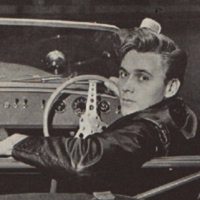 The next chapter
'Before The Boom' relates the stories of
the Merseyside artists who were successful prior to the
Beatles, including Frankie Vaughan, Michael
Holiday, Billy
Fury (pictured left), Lance Fortune, Johnnie Gentle,
Michael Cox (I still need further information on
this former Quarry Bank School pupil who now lives down
under) and Russ
Hamilton. The next chapter
'Before The Boom' relates the stories of
the Merseyside artists who were successful prior to the
Beatles, including Frankie Vaughan, Michael
Holiday, Billy
Fury (pictured left), Lance Fortune, Johnnie Gentle,
Michael Cox (I still need further information on
this former Quarry Bank School pupil who now lives down
under) and Russ
Hamilton.
The Capital Of
Music
'The
Capital of Music' enters the 'Cunard
Yanks' controversy, which still holds sway and
needs further debating. I pose the question 'Why
Liverpool?' and explore some of the reasons why
Merseyside music developed as it did and the numerous
seminal influences ranging from George
Formby to Lonnie Donegan,
Elvis Presley to Arthur
Alexander and how artists such as Bill
Haley and Chuck Berry paid
tribute to Liverpool.
People and Places
We Remember
 'People And Places We
Remember' is a chapter about the venues and
promoters which helped to creature such a dynamic music
scene, with stories of such pioneering promoters as
Brian Kelly, Charlie
McBain and Dave Forshaw, with
mention of over 300 venues where local groups
performed. 'People And Places We
Remember' is a chapter about the venues and
promoters which helped to creature such a dynamic music
scene, with stories of such pioneering promoters as
Brian Kelly, Charlie
McBain and Dave Forshaw, with
mention of over 300 venues where local groups
performed.
The North South
Divide
'The
North South Divide' is the tale I mentioned -
how London ruled the roost and had to quickly plug
the 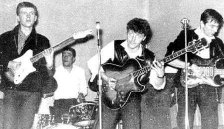 gap when the
Beatles and so many other artists revolutionised the music
scene. This is another good subject for debate and one,
I've no doubt, members of Merseycats have debated over the
years - for instance, why didn't Faron's
Flamingos (pictured left) become the group
who topped the charts with 'Do You Love
Me?' gap when the
Beatles and so many other artists revolutionised the music
scene. This is another good subject for debate and one,
I've no doubt, members of Merseycats have debated over the
years - for instance, why didn't Faron's
Flamingos (pictured left) become the group
who topped the charts with 'Do You Love
Me?'
In the early
issues of Mersey Beat I wrote an Editorial
'London - Take A Look Up North', which I
suppose still applies today.
The Poetry of the
Mersey Sound
'The
Poetry of the Mersey Sound' tells of the Mersey
poets who revolutionised the poetry scene, just
as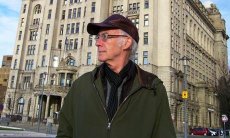 the groups
revolutionised the music scene. I also tell of the North's
first poetry to jazz concert, which I organised at the
Crane Theatre. These days I have been in
correspondence with Steve Aldo about his
poems, which I’ll be writing a blog about in the near
future. Adrian Henri, Roger
McGough (pictured right) and Brian
Patten made a tremendous impact on the literary
world - another plus for that Sixties
revolution. the groups
revolutionised the music scene. I also tell of the North's
first poetry to jazz concert, which I organised at the
Crane Theatre. These days I have been in
correspondence with Steve Aldo about his
poems, which I’ll be writing a blog about in the near
future. Adrian Henri, Roger
McGough (pictured right) and Brian
Patten made a tremendous impact on the literary
world - another plus for that Sixties
revolution.
It Started in Toxteth
'It
Started In Toxteth' relates the parallel music
scene in the city in which brilliant black artists were
to 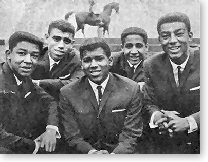 develop - from the
Chants (pictured left) to the
Real Thing. There is no doubt that
prejudice existed in the Sixties, although I personally
feel that the main record buyers in the early part of that
decade were young girls who were mainly devoted to the
cute looks of the young white teenage musicians. The
British public generally were prepared to buy records by
American black artists, but not British ones.
Derry Wilkie, Steve
Aldo, Sugar Dean, Alvin
Christie are among the other artists mentioned,
although I'm still researching talented singers such as
Colin Areety. The background to Toxteth
with its thriving clubs and shebeens is also
explored. develop - from the
Chants (pictured left) to the
Real Thing. There is no doubt that
prejudice existed in the Sixties, although I personally
feel that the main record buyers in the early part of that
decade were young girls who were mainly devoted to the
cute looks of the young white teenage musicians. The
British public generally were prepared to buy records by
American black artists, but not British ones.
Derry Wilkie, Steve
Aldo, Sugar Dean, Alvin
Christie are among the other artists mentioned,
although I'm still researching talented singers such as
Colin Areety. The background to Toxteth
with its thriving clubs and shebeens is also
explored.
The Nashville Of
The North
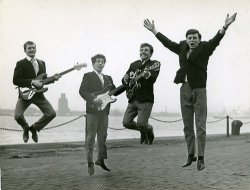 'The
Nashville of the North' follows the fortunes of
artists such as the Hillsiders (pictured left in
their previous incarnation Sonny Webb and The
Cascades), Hank Walters and
Charlie Landsborough when Liverpool
hosted the biggest country scene in Europe - another
major movement that time has overshadowed due to the
Beatles success. I'm still trying to find that list of
more than 100 C&W groups that Hank Walters
had. 'The
Nashville of the North' follows the fortunes of
artists such as the Hillsiders (pictured left in
their previous incarnation Sonny Webb and The
Cascades), Hank Walters and
Charlie Landsborough when Liverpool
hosted the biggest country scene in Europe - another
major movement that time has overshadowed due to the
Beatles success. I'm still trying to find that list of
more than 100 C&W groups that Hank Walters
had.
Folks Fab Four
'Folks
Fab Four' is the story of the
Spinners, Britain's No.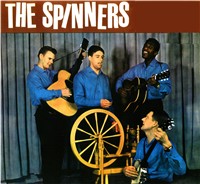 1 folk outfit for more than
a quarter of a century. The chapter also explores the
Merseyside blues scene at the time. Many people attribute
the British blues boom solely to London, although blues
music thrived in Liverpool and Alexis
Korner himself was to tell me, "The only place in
England that a blues guitarist would be able to find
recognition is Liverpool." Remember the great blues
artists at the Cavern and Mardi Gras - BB
King, John Lee Hooker,
Sonny Terry & Brownie McGee and
Liverpool bands such as the Roadrunners,
the Clayton Squares and the
Almost Blues. 1 folk outfit for more than
a quarter of a century. The chapter also explores the
Merseyside blues scene at the time. Many people attribute
the British blues boom solely to London, although blues
music thrived in Liverpool and Alexis
Korner himself was to tell me, "The only place in
England that a blues guitarist would be able to find
recognition is Liverpool." Remember the great blues
artists at the Cavern and Mardi Gras - BB
King, John Lee Hooker,
Sonny Terry & Brownie McGee and
Liverpool bands such as the Roadrunners,
the Clayton Squares and the
Almost Blues.
Music is A
Religion
'Music
Is A Religion' is the little known story of the
thriving Christian music scene on Merseyside with
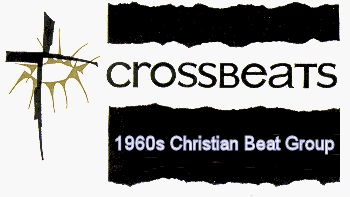 groups such as the
Crossbeats, reckoned to be the equivalent of the
Beatles in the British sixties Christian scene. Merseyside
was awash with Christian bands playing at scores of venues
- including places such as the Philharmonic and Central
Halls, plus ferries to the Isle of Man, packed with 2,000
fans each trip. groups such as the
Crossbeats, reckoned to be the equivalent of the
Beatles in the British sixties Christian scene. Merseyside
was awash with Christian bands playing at scores of venues
- including places such as the Philharmonic and Central
Halls, plus ferries to the Isle of Man, packed with 2,000
fans each trip.
The Liver
Birds
 'The Liver
Birds' tells the story of the literally hundreds
of female artists from Liverpool. The chapter was so long
I had to prune it mercilessly. Sadly, I left out the
female movers and shakers in Liverpool who were not
singers, but worked behind the scenes and made their own
contribution to that revolution - Virginia at
Mersey Beat, Mo Best,
Frieda Kelly, Beryl
Adams etc 'The Liver
Birds' tells the story of the literally hundreds
of female artists from Liverpool. The chapter was so long
I had to prune it mercilessly. Sadly, I left out the
female movers and shakers in Liverpool who were not
singers, but worked behind the scenes and made their own
contribution to that revolution - Virginia at
Mersey Beat, Mo Best,
Frieda Kelly, Beryl
Adams etc
The Hosts With The Most
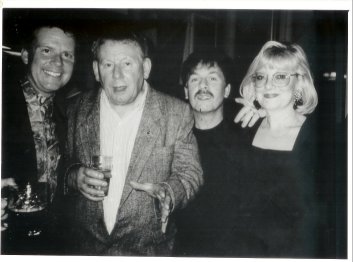 'The Hosts With
The Most;' relates the fortunes of the comperes
and disc jockeys, from Bob Wooler (pictured left
with MerseyCats Chairman Wally Shepard, Kay Shepard and
Cliff Roberts) and Billy
Butler to John Peel and
Kenny Everett - and the final piece
is an afterword, looking at the vibrant scene today and
listing the amazing number of Liverpool artists who have
topped the British charts. 'The Hosts With
The Most;' relates the fortunes of the comperes
and disc jockeys, from Bob Wooler (pictured left
with MerseyCats Chairman Wally Shepard, Kay Shepard and
Cliff Roberts) and Billy
Butler to John Peel and
Kenny Everett - and the final piece
is an afterword, looking at the vibrant scene today and
listing the amazing number of Liverpool artists who have
topped the British charts.
I hope the book
contributes to the real understanding of the unique
events which occurred on Merseyside which led to a
worldwide revolution in popular music - yet I still
feel I have only scratched the surface!
Bill's book is
available now at Amazon
|